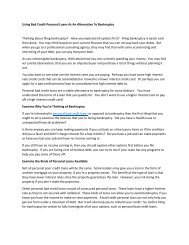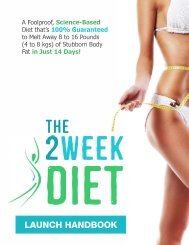Rapid Weight Loss With 2 Week Diet
http://sebasstuff.2weekdiet.hop.clickbank.net/ The 2 Week Diet is based on medical science, rational thoughts and real-life proven results. As of right now, you can rest assured that you will never need to buy another diet book, fancy gizmo or magic pill to lose weight ever again. Quite simply, The 2 Week Diet cuts through the bull and gives you a time-tested, effective and proven blueprint for rapid fat loss.
http://sebasstuff.2weekdiet.hop.clickbank.net/
The 2 Week Diet is based on medical science, rational thoughts and real-life proven results. As of right now, you can rest assured that you will never need to buy another diet book, fancy gizmo or magic pill to lose weight ever again. Quite simply, The 2 Week Diet cuts through the bull and gives you a time-tested, effective and proven blueprint for rapid fat loss.
Create successful ePaper yourself
Turn your PDF publications into a flip-book with our unique Google optimized e-Paper software.
METABOLISM<br />
The primary function of our metabolism is simply to provide the right amount of<br />
fuel (at the right time) to keep our bodies alive and functioning. It accomplishes this<br />
through a complex series of chemical reactions whereby food is converted to the<br />
energy we need. When we eat, the food we swallow enters our digestive tract and<br />
is broken down by digestive enzymes. Carbohydrates are converted to glucose, fats<br />
to fatty acids and protein to amino acids. Once these nutrients are broken down,<br />
they are absorbed by the bloodstream and carried into the cells of the body. Our<br />
metabolism then works to either release these nutrients as energy, use them to build<br />
and repair lean tissue or store them for later use.<br />
There are two basic metabolic processes—one is constructive and is responsible<br />
for building and storing energy for the body. The other is destructive, though<br />
in a positive sense, as it breaks down nutrient molecules to release energy. The<br />
constructive metabolic process is called anabolism, whereas the destructive process<br />
is called catabolism.<br />
Anabolism: promotes the growth of new cells, the maintenance and repair<br />
of tissues, and the storage of energy—usually through body fat—for future<br />
use. Small nutrient molecules are converted into larger molecules of protein,<br />
carbohydrates and fat.<br />
Catabolism: is responsible for immediately providing the body energy to use.<br />
Instead of building up, it breaks down the nutrient molecules to release energy.<br />
These two processes do not occur simultaneously but are balanced by the body<br />
based on several factors.<br />
Catabolism, in particular—though some attribute this to overall metabolism—has<br />
three components:<br />
1. Basal metabolism: sometimes called<br />
resting metabolism, this is the metabolism<br />
component responsible for keeping you alive<br />
by ensuring normal body functions. Even if<br />
you were bedridden the whole day, basal<br />
metabolism is still at work. Basal metabolism<br />
is metabolism’s main component, as 60 to 70<br />
percent of the calories from the food you eat<br />
The 2 <strong>Week</strong> <strong>Diet</strong> - Launch Handbook | 25
















